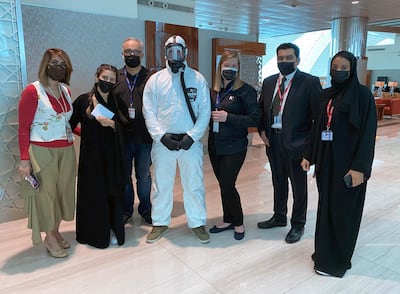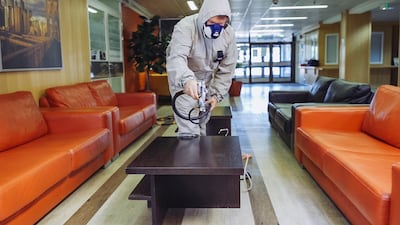An invisible protective shield using nanotechnology to fight Covid-19 has been trialled at Dubai International Airport to encourage safer travel.
Areas operated by Emirates airline were sprayed with Nanoksi’s photocatalytic antimicrobial coating, which offers protection from all viruses for up to a year.
The coating, called Fotonit, is applied in a spray and uses energy from visible light to generate reactive oxygen peroxides, which in turn decompose all organic material.
Trial results will determine whether Emirates adopts the technology.
Nanoksi Finland’s chief executive, Dr Pasi Keinaenen, was involved in the research and development of the photocatalytic coating.
He said he hopes the trial will lead to airports around the world adopting the solution.
“Although it is light-activated it does not require ultraviolet light, so can be applied indoors,” he said.
“You cannot see or feel it; it is non-toxic and can be reapplied in high-abrasion areas every 12 months.
“It is purely initiating a natural reaction and does not contain any polymers, so it is highly resistant to high and low temperatures.
“Manual sanitation up to eight times a day is labour-intensive and expensive, so this is a much more efficient alternative.
“Hopefully, the Dubai trial will become the concept for all other airports around the world.”
Emirates airline, Airbus, Collins Aerospace, GE Aviation and Thales formed the Aviation X Lab partnership to promote innovation in aviation.
The Nanoksi spray was selected from 107 international entries for the Aviation X Lab Accelerate Traveller Wellbeing Challenge.
The competition invited companies to submit ready-for-market coronavirus-related products and solutions to bolster health and safety in the travel sector.
Developed in Finland, Nanoksi found that Fotonit reduced cases of norovirus and flesh-eating bacteria such as MRSA in hospitals and care homes.
Norovirus is estimated to cause about 200,000 deaths worldwide each year, while superbugs like MRSA are responsible for about 700,000 deaths annually, according to the US Centres for Disease Control and Prevention.

Analysis of the effectiveness of the solution applied at Dubai International Airport is under way.
The technology was developed in 2017 and has been used in more than 2,000 places in eight countries, mostly in Europe.
Manufacturing and supply chains can increase production to suit global demand, should airport tests prove successful.
During the 10-week trial, Fotonit was used to disinfect Emirates waiting lounges, unaccompanied minor areas, airport buggies, limousines for business class, and the business and first-class lounges.
“Emirates airline chose to explore this project with us to see how we could secure the passenger journey from home and through the airport,” said Katja Boutou, Nanoksi’s director of global operations.
“Testing of the cleanliness of surfaces and the presence of microbes took place in certain areas of the airport managed by Emirates.
“Measurements were taken before the coating and then again a week after it was applied to assess its effectiveness in creating a Covid-free environment.
“This could have a huge impact in this region, particularly in Dubai as it is such a busy transit hub.”
Read More
Hope Consortium: Abu Dhabi will become gateway to the world in mammoth vaccine logistical operation
Technology reduces Bahrain's King Fahd Causeway waiting times by 90 per cent
Arabian Travel Market: Hygiene now 'number one demand' from travellers, say hotel owners
Travel industry leaders said hygiene was the number one consideration for tourists this summer.
Michel Augier, regional director of Wyndham Hotels and Resorts, said cleanliness is important to hotels and guests “like never before”. He was speaking at Dubai’s Arabian Travel Market trade fair.
Dubai International Airport recently received Airport Health Accreditation for its health and safety measures to protect passengers and staff during the pandemic.
The Airports Council International awarded the status due to the measures under way at Dubai International Airport such as fumigation, periodic deep-cleaning, hand sanitiser stations and the use of protective Plexiglass screens at check-in and immigration counters.
“Businesses where this is used in Finland have seen a reduction in sick leave as staff are not picking up other viruses, so it saves money there,” Dr Keinaenen said.
“When Covid hit, it was obvious this was going to be a big area of growth for us.
“There is no way any organic material can be resistant to it, so it will protect against any future pandemics.”








